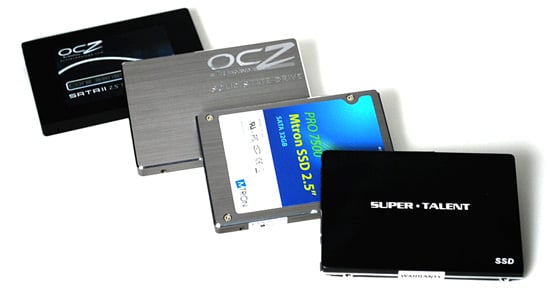Four-Way SSD Round-Up, OCZ, Super Talent, Mtron
Introduction and Specifications
Solid State Drive technology is set to turn the storage industry on its ear; there is little doubt of this. When you consider the intrinsic benefits of anything built on solid state technology versus anything mechanical, it doesn't take a degree in physics to understand the obvious advantages. Consider the vacuum tube in its day before the advent of the transistor and you'll get the idea. Though audiophiles may argue the tube still sounds "warmer" and more natural, you certainly wouldn't even been reading this page, if it were not for solid state technology. As such, it's a natural evolution that obviously, some day, better technology needed to be developed for mass storage.
In comparison to standard rotational media, SSDs offer lower power, complete silence, exponentially faster random access times and extremely competitive read/write throughput, versus even the fastest hard drives on the market today. Moving forward, SSD specifications and performance will improve significantly as well. Though SSDs are still not really considered a "mainstream" consumer storage solution for computing, you can easily see on the horizon that the day is coming quickly when the SSD will completely take over personal computing and eventually even the enterprise markets.
On the following pages, we thought we'd level-set the features, performance and pricing landscape for you with respect to the current state of SSDs. In the coming weeks you'll see a major release from Intel for their new SSD offering as well, so we'll be sure to return to this equation again in the near future. For now, we have a look at four different SSD offerings, two from OCZ, one from Mtron and another from Super Talent. Is a Solid State Disk in your future? We'll try to help you answer that question in this full performance evaluation and showcase.

|
|
|
|
|
| ||||||||||||||||||||||||||||||||||||||||||||||||||||
|
OCZ Core Series 64GB MLC
|
OCZ 64GB Standard SLC |
||||||||||||||||||||||||||||||||||||||||||||||||||||
|
|
|
|
| ||||||||||||||||||||||||||||||||||||||||||||||||||||
|
Super Talent
|
Mtron MSP 7500 32GB SLC
| ||||||||||||||||||||||||||||||||||||||||||||||||||||
|
|
There are some subtle and not-so-subtle differences in each of the SSDs we're going to step you through today. First, we should point out that we have two SLC-based disks and two MLC-based disks in this round-up, which also means two very distinct sets of price points and reliability. We'll cover this in more detail next. All of our SSDs here are showing sustained read bandwidth north of 100MB/sec, with the Core Series drive from OCZ topping out at 143MB/sec. Write throughput ranges from 80MB/sec to 130MB/sec for the Mtron drive, which is the fastest in terms of claimed write performance. All of the drives have average access times specified at a tenth of a millisecond, which, as you can imagine, is lighting-fast compared to even the fastest spinning hard drives out there, which top out at 3 - 4ms.
Finally, as you'll notice, if you compare Super Talent's write endurance spec to Mtron's, SLC-based drives have significantly longer life expectancies. We'll dive into the major differences between SLC and MLC-based flash media next.










